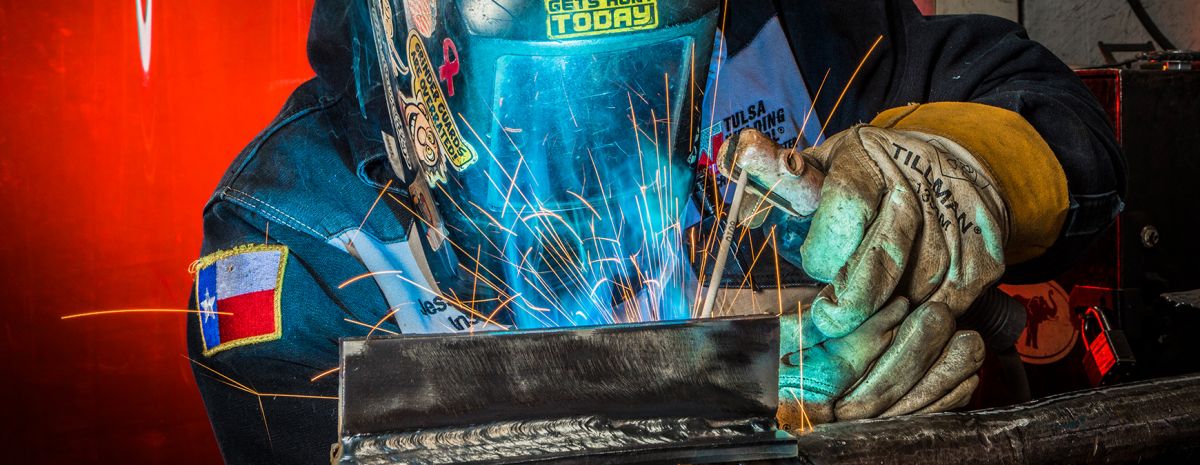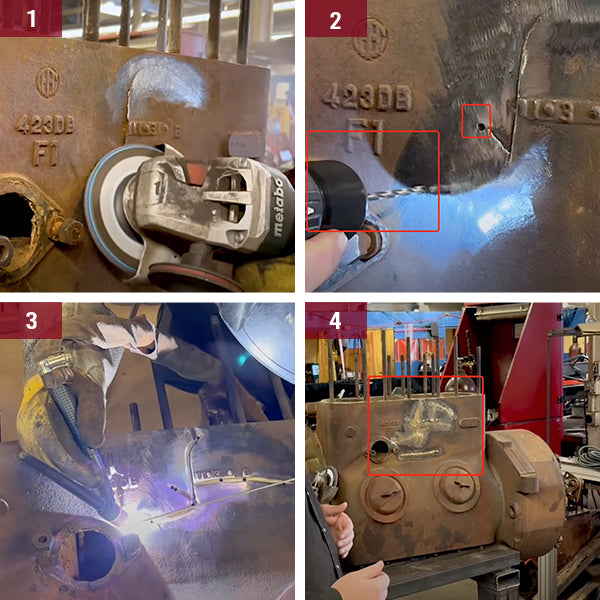All About Welding: Secret Insights Into Techniques and Finest Practices for Success
Welding encompasses a variety of methods, each matched for specific materials and applications. Understanding these methods, such as GMAW, SMAW, and TIG, is essential for achieving perfect outcomes. Additionally, the right devices and safety methods can not be overlooked. As prep work and repairing play vital duties in the welding process, grasping these components can substantially enhance the quality of the end product. What are the key aspects that ensure a successful weld?
Understanding Different Welding Methods
Welding methods encompass a variety of approaches, each matched to certain applications and products. Amongst the most common methods are Gas Metal Arc Welding (GMAW), Shielded Steel Arc Welding (SMAW), and Tungsten Inert Gas Welding (TIG) GMAW, also called MIG welding, is prominent for its rate and versatility, making it suitable for thin products. SMAW, or stick welding, is favored for its simpleness and efficiency in exterior atmospheres, especially with thicker steels. TIG welding supplies accuracy and control, making it ideal for detailed job and non-ferrous metals (Montana Mobile Welding and Repair Welding). Each strategy has its unique benefits and considerations, allowing welders to select the ideal method based upon the task's requirements, product type, and desired results. Recognizing these strategies is crucial for successful welding
Vital Welding Devices and Tools
While different welding strategies require details skills, the right equipment and tools are equally essential for achieving high quality outcomes. Important welding tools includes welding makers, which differ relying on the method-- such as MIG, TIG, or stick welding. Protective gear, including aprons, headgears, and gloves, warranties safety and security and comfort during the process. On top of that, fixtures and clamps assist protect products in position, ensuring accuracy in welds. Consumables like welding rods, cable, and shielding gas are additionally critical elements that influence the quality of the weld. Devices such as cutters and grinders assist in surface prep work and post-weld completing, contributing to a professional result. Purchasing premium devices inevitably enhances the effectiveness and efficiency of welding tasks.
Security Practices in Welding
Correct safety methods are important in the welding market to safeguard workers from possible dangers. Welders need to use ideal personal protective devices (PPE), consisting of safety helmets with appropriate shading, handwear covers, and flame-resistant garments. Appropriate ventilation is important to reduce direct exposure to damaging fumes and gases produced during the welding process. In addition, workers should be learnt the correct handling of welding equipment to avoid crashes. Fire safety and security steps, such as keeping flammable products away from the welding area and having fire extinguishers readily offered, are needed. Regular inspections of devices and work spaces can aid identify prospective threats prior to they cause crashes. By adhering to these security techniques, welders can develop a safer working environment and decrease risks connected with their profession.
Readying Products for Welding
Preparing products for welding is an essential step that greatly affects the quality and integrity of the end product (Montana Mobile Welding and Repair Welding). Appropriate prep work entails cleaning up the surfaces to remove impurities such as corrosion, dirt, and oil, which can jeopardize the weld. Strategies such as grinding, sanding, or making use of solvents are commonly employed to achieve a tidy surface. Furthermore, making certain that the materials fit with each other snugly is crucial; gaps can lead to weak welds. It's also important to think about the alignment and positioning of the components, as this will influence the ease of welding and the final result. Choosing the appropriate filler material and making certain compatibility with the base metals is important for achieving solid, durable welds.
Tips for Getting High-Quality Welds
Achieving high-grade welds requires focus to information and adherence to ideal methods throughout the welding process. Proper joint preparation is crucial, making certain surface areas are totally free and tidy from pollutants. Selecting the proper filler material and welding technique based upon the base steels is important for perfect bonding. Keeping constant traveling speed and angle while welding can promote and avoid problems harmony. Additionally, controlling warm input is essential; too much heat can lead to warping and deteriorated joints. On a regular basis checking the welds throughout the process permits immediate adjustments if essential. Employing suitable post-weld therapies, such as cleansing and stress relief, can improve the toughness and stability of the weld, eventually making certain an effective result.
Fixing Typical Welding Issues
Welding often offers challenges that can impact the top quality and stability of the end product. Common issues such as porosity, inconsistent weld beads, and getting too hot can emerge, each needing specific troubleshooting techniques. Understanding these problems is crucial for welders to enhance their skills and achieve suitable results.
Porosity Issues Described
Although porosity can often be forgotten, it remains a crucial issue in welding that can compromise the stability of a completed item. Porosity refers to the existence of tiny gas pockets within the weld grain, which can weaken the joint and lead to early failure. This problem normally occurs from pollutants, moisture, or incorrect shielding gas coverage throughout the welding procedure. To reduce porosity, welders should verify that the base materials are clean and completely dry, utilize proper securing gases, and maintain consistent welding specifications. Consistently evaluating the tools and setting can also help determine possible problems before they manifest in the weld. Attending to porosity effectively is necessary for accomplishing solid, long lasting welds that satisfy high quality criteria.

Inconsistent Weld Beads
Irregular weld beads can substantially affect the quality and toughness of a finished product. Various elements add to this concern, consisting of inappropriate travel rate, inaccurate amperage setups, and inconsistent electrode angles. When the welder relocates also quickly, a bead may show up narrow and do not have penetration, while moving too slowly can trigger extreme accumulation. In addition, making use of the wrong amperage can lead to either damaging or excessive spatter, both of which concession weld honesty. The welder's strategy, such as inconsistent torch activity, can likewise lead to unequal bead appearance. To reduce these troubles, welders must concentrate on keeping stable, controlled motions and making sure appropriate devices setups to achieve uniformity in their welds. Uniformity is essential to attaining solid and trustworthy welds.
Overheating and Bending Issues
Extreme warm throughout the welding procedure can bring about significant getting too hot and buckling concerns, influencing the architectural honesty of the work surface. These troubles frequently materialize as distortion, which can endanger positioning and fit-up, making more assembly challenging. Factors adding to overheating consist of the option of welding parameters, such as voltage and take a trip rate, along with the sort of product being bonded. To minimize these issues, welders should maintain best mig welder under 1000 constant travel rate and proper heat input while keeping track of the work surface temperature. Furthermore, preheating or post-weld warm treatment can aid alleviate tensions triggered by quick air conditioning - Montana Mobile Welding and Repair Welding. Normal inspection and adherence to ideal techniques are important in stopping getting too hot and ensuring the longevity and dependability of welded frameworks
Often Asked Questions
What Are the Career Opportunities in the Welding Market?
The Website welding market provides varied profession chances, consisting of positions as welders, teachers, engineers, and examiners. Specialists can operate in production, building and construction, aerospace, and auto sectors, profiting from solid need and competitive salaries in different duties.
How Can I Boost My Welding Speed Without Sacrificing Top Quality?
To enhance welding rate without compromising top quality, one should practice effective techniques, preserve tools, maximize setups, and boost hand-eye coordination. Normal training and looking for comments can likewise greatly add to achieving faster, high-quality welds.
What Certifications Are Offered for Welders?
Various accreditations exist for welders, consisting of those from the American Welding Culture (AWS), the National Facility for Building And Construction Education And Learning and Research (NCCER), and numerous industry-specific companies. These credentials improve employability and demonstrate ability effectiveness.
Just How Does Welding Affect the Qualities of Metals?
Welding affects the properties of metals by changing their microstructure, which can bring about modifications in solidity, stamina, and ductility. Heat input and cooling prices during the process substantially impact these product characteristics.
Can I Bonded Dissimilar Metals Together?
